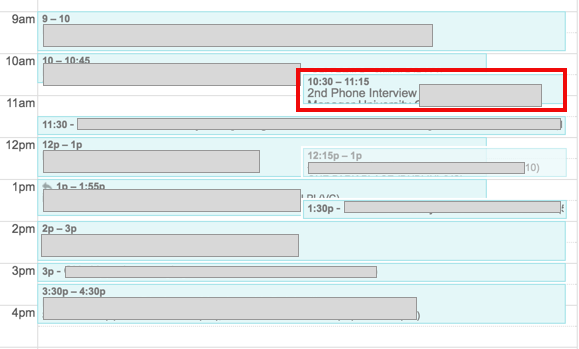During the height of university recruiting season at Dropbox, from August to November, I conduct 2–3 phone interviews per week.
Having done more than 40 phone interviews, I have a routine I follow to prep, conduct, and evaluate phone interviews.
I want to give you a glimpse of what it’s like as the person giving the phone interview to help provide tactical advice.
Here’s a video of 3 quick phone interview tips. Read on to get more details on the tips.
Interviewers are busy, just like you
Here’s an actual screenshot of my calendar on a typical day that I’m giving a phone interview:

I show you this just to remind you that your phone interviewer has a lot of other things going on in his day. So don’t freak out if your interviewer is a few minutes late calling or is a little tense at the beginning of the call.
30 sec. prep for the call, but hours of calibration prep
Before I dial your phone number, I look at your resume for 30 seconds, probably less. I only look at it to get a sense of your background and hunt for any interesting highlights.
Even though I only spend 30 seconds preparing on the day of, I’ve done hours of interview training beforehand to calibrate.
At the start of every interview season, all of the interviewers “calibrate” on the interview questions we ask. We all meet to go through how best to ask the interview question, review the evaluation criteria, and how to grade candidates’ answers by walking through examples of good and bad answers.
We are then paired up with more experienced interviewers to shadow at least 2 interviews. As a shadow, you listen silently in on interviews that the more experienced interviewer gives and then debrief with them after to talk through how to assess the interview.
In addition to shadowing and before you start giving interviews by yourself, you are reverse shadowed. An experienced interviewer will sit in on your first few interviews you give to provide feedback on how you’re conducting them.
There’s a lot of up front work that goes into getting the entire interview panel calibrated and the interview standardized. This ensures, as best as possible, the interviewers are evaluating candidates on the same criteria and scale.
All this to say, don’t expect your phone interviewer has thoroughly reviewed your resume, but don’t interpret that as the interviewer isn’t prepared.
During the call, I’m trying hard to understand what you’re saying and taking notes at the same time.
I’m calling you on speakerphone from a small conference room with my laptop open, following an interview template, listening to your answers, typing out your responses, and coming up with follow up questions.
There’s a lot going on all at once.
The phone interview set up is never ideal, so while this sounds obvious, make sure you are in a quiet place with good reception. I’ve done phone interviews where I’ve had to call the candidate multiple times because the call dropped. Other times, there’s distracting background noise because the candidate is walking outside or in a public place.
I know you can’t control everything, but try to put yourself in a position where the only thing you or I need to worry about is your answers.
Slow down, pause, check in, and move on.
Since you can’t see the interviewer’s reactions in person, it can be difficult to get a feel for the cadence of the phone interview.
The most common pitfall is speaking too quickly. While answering a question, many candidates tend to feel the need to convey every detail possible and combining that with a dose of nervousness leads to rapid monologues.
Slow down. Make sure to answer the question concisely and then pause. If you sense that the interviewer wants more detail, check in and ask, “Would you like me to explain further?” If they want more, they’ll let you know, if not, just move on and wait for the interviewer to ask another question.
Relatedly, after you answer a question, if there is silence on the interviewer’s end, resist the temptation to fill the silence! Silence is not a negative signal! More often than not, the interviewer is trying to catch up on typing notes. Don’t pile on irrelevant or repetitive details. Rambling is a negative signal and while it won’t be the reason why you don’t get an offer, if it’s particularly noticeable, it’ll get brought up during the debrief when the interview panel is deciding whether or not to extend you a job offer!
Advice to ramblers: voice record yourself.
If you have a tendency to ramble, or even if you don’t, voice record yourself answering standard interview questions. Take a question like, “Walk me through your resume” and record yourself answering it. You’ll immediately hear if you’re rambling, saying fillers like “um” or “like”, and if the content of your answer is compelling or not.
What happens after the phone interview?
After a phone interview, I write up interview feedback in an applicant tracking software tool. I try to submit my feedback as soon as possible, sometimes immediately after the interview ends and at least by the end of the day.
Writing interview feedback
For each type of interview, there’s a standard set of questions the interviewer answers that maps to the pre-determined evaluation criteria. For instance, one of the phone interviews I conduct looks into how the candidate resolves conflict.
When answering each question, I’m deciding whether or not the candidate “meets the bar” for that specific evaluation criterion. Also, I’m noting any “spikes” or particular strengths that really came through during the interview.
While the interview feedback questions leave room for interpretation, I include specific quotes and examples from the candidate’s answers to provide evidence for my reasoning.
After I’ve written all of my feedback, based on how the candidate’s answers line up with the evaluation criteria, I decide whether the candidate moves on to the next round or not.
If a candidate passes the phone interview, they will do another series of interviews, usually on-site. After each of the subsequent interviews, the interviewers will also write feedback, assessing the candidate based on the type of interview given.
The Debrief
After the candidate has gone through all of their interviews, every person who interviewed that candidate, whether it was over the phone or in-person, meets to debrief.
During the debrief, there’s a discussion reviewing all of the feedback and clarifying any specific points. At the end, based on all of the feedback and evaluation criteria for the role, the final decision is made by the hiring manager whether or not to extend an offer to the candidate.
Hope this inside look helps you better prepare for your next phone interview!
